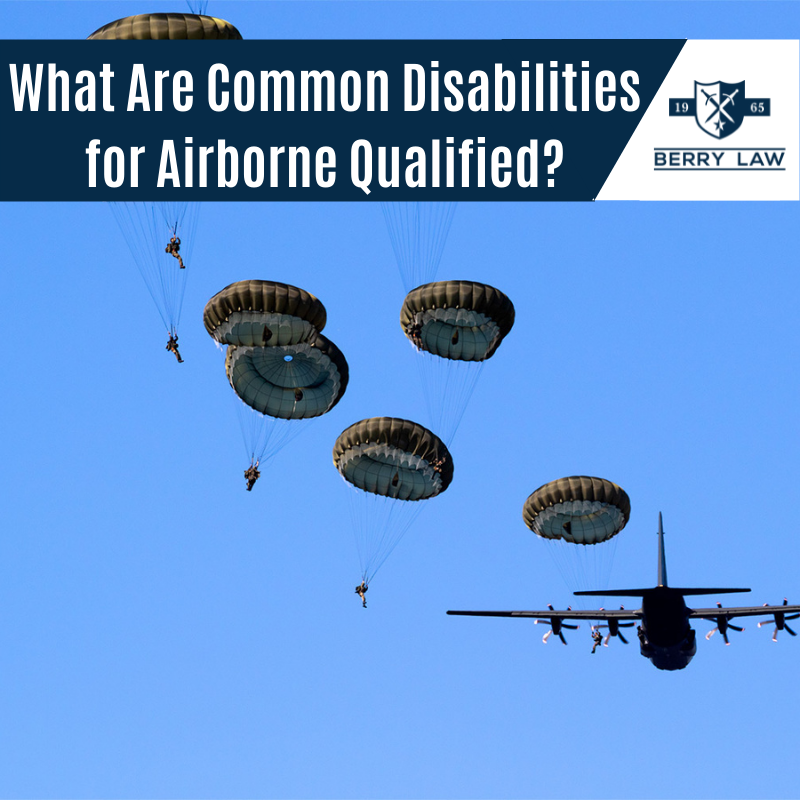
Airborne-qualified Veterans endure some of the most rigorous training and demanding missions in the military. While their contributions are invaluable, the physical toll of repetitive parachute jumps and rough landings can result in long-term disabilities. These disabilities often affect the musculoskeletal system, nervous system, and mental health. Understanding these conditions is essential for Veteran paratroopers who seek VA disability compensation.
The high-impact landings that come with parachute jumps put significant strain on the joints, particularly the knees, hips, and back. Over time, these repeated impacts can lead to chronic conditions.
These conditions can severely limit mobility and daily functioning, impacting the Veteran’s quality of life. Veterans often face challenges in proving the service connection for these conditions, especially when they manifest years after service. Expert legal assistance can help establish the necessary medical evidence to connect these injuries to airborne duties.
Airborne operations pose a significant risk for head injuries, even with the use of helmets and other protective gear. Hard landings, collisions with equipment, or unexpected obstacles during a jump can result in traumatic brain injuries (TBI). TBIs range from mild concussions to more severe brain trauma, leading to long-term complications:
TBIs are often referred to as invisible injuries because their symptoms may not be immediately apparent. Many Veterans may not seek treatment until the symptoms interfere with their daily lives. For this reason, proving service connection for TBI-related disabilities can be challenging. Veterans need detailed medical records and expert testimony to link their symptoms to service-related incidents. Berry Law’s experienced team can help build a compelling case to support your TBI claim.
The physical dangers of airborne operations are clear, but the psychological toll can be just as profound. Veterans who have participated in high-stress missions or combat jumps may develop Post-Traumatic Stress Disorder (PTSD) or other mental health conditions. These conditions may be triggered by life-threatening situations, the loss of fellow soldiers, or prolonged exposure to combat environments.
PTSD can manifest in various ways, including:
Other mental health issues common among airborne Veterans include anxiety disorders and depression, which can be exacerbated by the physical limitations caused by injuries. These conditions can significantly impair daily functioning, relationships, and employment. Mental health claims require thorough documentation, including a diagnosis from a qualified mental health professional and a clear connection to service-related experiences. Berry Law’s team is well-versed in gathering the necessary evidence to strengthen your mental health disability claim.
While airborne operations primarily impact the musculoskeletal and nervous systems, auditory issues are also a significant concern. Exposure to loud noises from aircraft engines, explosions, and firearms can lead to hearing loss and tinnitus (ringing in the ears). These conditions may not be immediately noticeable, but over time, they can severely affect a Veteran’s ability to communicate and function in daily life.
Hearing loss and tinnitus are some of the most common service-connected disabilities among Veterans. However, because they may seem less severe than other physical or mental health conditions, they are often overlooked or undercompensated by the VA. Veterans experiencing these issues should seek a thorough hearing evaluation and document how these conditions affect their daily lives.
Airborne Veterans face unique challenges when it comes to securing VA disability benefits. Many of the injuries and conditions associated with airborne service may take years to manifest, making it difficult to establish a direct connection to service. Additionally, the VA’s complex claims process can be overwhelming, especially for Veterans dealing with multiple disabilities.
This is where Berry Law comes in. With a team composed of Veterans and military advocates, we understand the intricacies of airborne service and the challenges Veteran paratroopers face. Whether you’re filing an initial claim or appealing a denial, we are relentless in pursuing the benefits you deserve. Our experience in handling complex cases, gathering compelling medical evidence, and navigating the VA’s system ensures that your claim is in capable hands.
Veterans who have been denied their claims for service-connected VA paratrooper disabilities should not navigate the appeals process alone. Berry Law’s dedicated attorneys are here to fight for your rights and help you secure the compensation you’re entitled to. Contact us today for a free consultation and let us help you get the justice you deserve.
Sources:
Our monthly newsletter features about important and up-to-date veterans' law news, keeping you informed about the changes that matter.